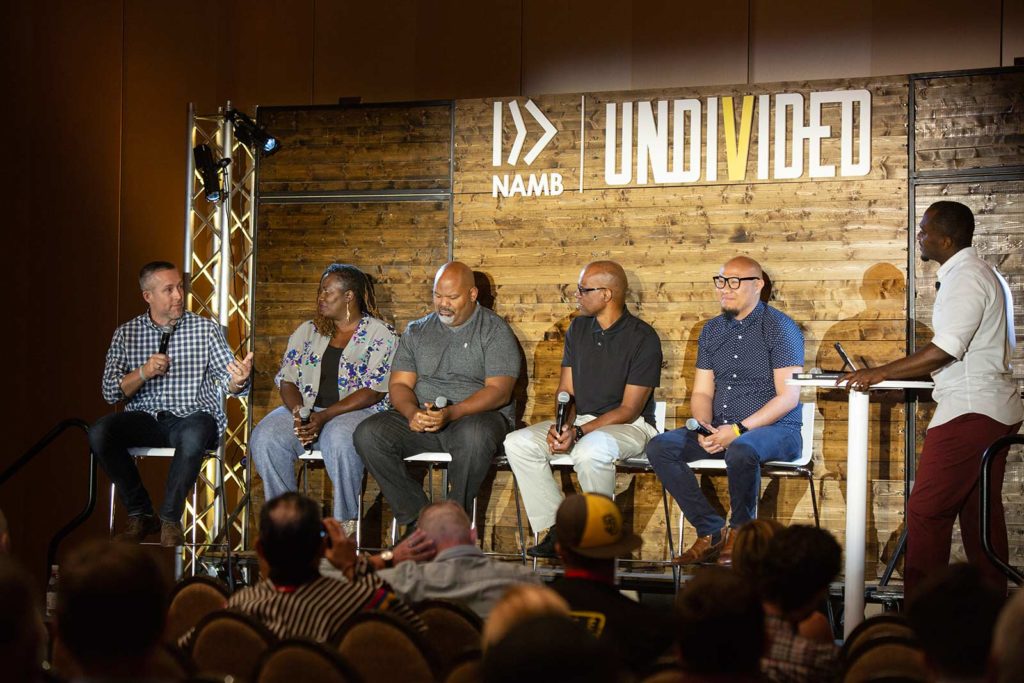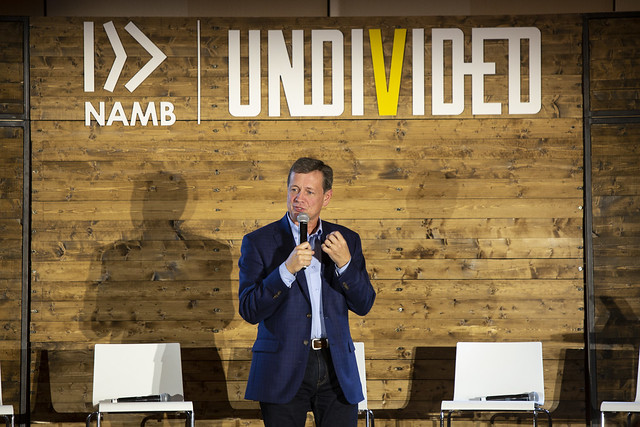By Brandon Elrod
On Tuesday night, June 12, during the Southern Baptist Convention (SBC) annual meeting, the North American Mission Board (NAMB) hosted a breakout session on racial reconciliation in conjunction with release of a resource designed to help pastors and churches bridge the racial divide in their communities. Undivided: Your Church and Racial Reconciliation helps churches pursue reconciliation.
Those who attended the session heard a pair of panel discussions centering on: the history of race relations in the SBC, the current issues that divide different ethnicities and next steps toward a unified mission. Dhati Lewis, executive director of community restoration at NAMB and lead pastor of Blueprint Church in Atlanta, hosted the event.
“As a church, we have an amazing opportunity to display our unity in Christ to a divided world,” said Lewis. “But to do so, we have to be willing to run into the tension with a heart for reconciliation and address the issues that divide us. This is a missional issue. If we want to make disciples in North America, we must address the issue of race.”
After an introductory discussion with Kevin Ezell, president of NAMB, Lewis then facilitated two different panel discussions before concluding the night in prayer.
“I’ve been a pastor in the SBC well over 20 years,” said Ezell. “I’ve been president of NAMB for over seven years. Quite honestly, I’m really tired of talking about [the race issue], having forums and conferences about it and seeing nothing ever change on it.”
The first panel focused on the question, “How did we get here?” and featured Ed Litton, senior pastor of Redemption Church in Saraland, Ala., his wife Kathy Ferguson Litton, director of planter spouse care at NAMB, Vance Pitman, senior pastor of Hope Church in Las Vegas, Nev., Kevin Smith, executive director of the Baptist Convention of Maryland-Delaware, Jose Abella, lead pastor of Providence Road Church in Miami, Fla., and D.A. Horton, pastor of Reach Fellowship in North Long Beach, Calif.
Lewis took the audience through the ideas in George Yancey’s book, Beyond Racial Gridlock, to help those attending understand the different, secular approaches that have created roadblocks to racial reconciliation: colorblindness, Anglo-conformity, multiculturalism and white responsibility.
“Many models related to dealing with racial reconciliation—social, political, whatever—stem from dealing with the consequences of sin and its results rather than dealing with the plan of God and starting that way,” said Smith, describing the need to extend beyond secular models.
The panelists went on to share their wide-ranging experiences in dealing with racial issues—from Litton preaching about race in Mobile, Ala., to Abella growing up as an English-speaking Latino in the United States, to Pitman living a life sheltered from racial issues while growing up in rural Alabama.
Horton cited Francis Schaeffer’s book, The Great Evangelical Disaster, to describe the depth of the wounds left by slavery and racism in Evangelical Christianity and the SBC. He quoted from 2 Corinthians 7 to emphasize the need for godly repentance and sorrow in order to move forward.
Pittman described how the church fails its community when it does not reflect its community, and Abella mentioned how the church faces a gospel problem when it refuses to reach its neighbors because of cultural and ethnic roadblocks.
The second panel dealt with the question, “Where do we go from here?” and featured J.D. Greear, pastor of The Summit Church in Durham, N.C., and newly elected president of the SBC, James Roberson, lead pastor of The Bridge Church in Brooklyn, N.Y., Daniel Yang, director of the Send Institute at Wheaton College, Jackie Taylor, national MyBLVD wives specialist for the Community Restoration team of NAMB, and George Yancey, professor of sociology at the University of North Texas.
Yancey explained the various models that he describes in his book and identified the main issue that each secular model listed above overlooks—human depravity. People readily see the depravity in people they disagree with while “failing to notice the depravity in themselves,” he said, which leads people to demonize those with whom they disagree.
All of the panelists shared how their backgrounds shaped their various perspectives, explaining their hurts, experiences and their input into how believers can move forward. Those on the second panel described their expectations for the future of the SBC.
Despite the difficulty, Yang emphasized the need for the SBC to fight for diversity as a convention in order to reach a diverse world. He ended the panel discussion, saying of the future of racial reconciliation in the SBC, “I’m optimistic because Revelation has been written already. It’s going to happen.”
NAMB will publish the content of the breakout session. Follow namb.net for updates and visit undivided.net to view or download the video material for Undivided.
Brandon Elrod writes for the North American Mission Board.
Published June 13, 2018


